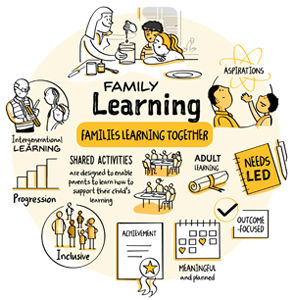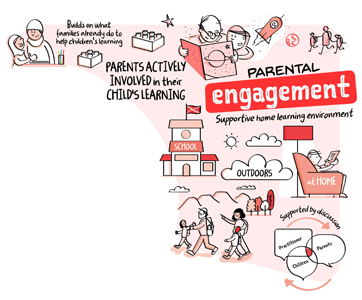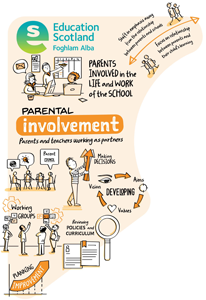Tayside Family Learning and Parental Engagement Creative Conversation series
Education Scotland has been working in partnership with colleagues from Tayside Regional Improvement Collaborative and external partners to produce a series of four Creative Conversations. These sessions took place from March to June 2021 and were aimed at practitioners and staff across all sectors who have responsibility or are involved in supporting children and families. The sessions included opportunities to share practice in Family Learning and Parental Engagement during Covid-19.
Session 1: What is Parental Engagement? What is Family Learning?
Session aims:
- explore Parental Engagement and Family Learning from a national perspective
- help participants to understand the differences between Parental Engagement and Family Learning
- allow participants to share current priorities in the field of Parental Engagement and Family Learning
Session 2: Effective Partnerships
Session aims:
- provide a national picture of how effective Parental Engagement and Family Learning partnerships contribute to successful outcomes for children and families
- allow practitioners to share current priorities and examples of effective partnerships across Tayside
Session 3: Supporting Literacy and Numeracy at home
Session aims:
- provide a national picture of developments to support literacy and numeracy through Parental Engagement and Family Learning
- explore how the development of effective partnerships with families has supported literacy and numeracy learning at home during the Covid-19 pandemic
Session 4: Self-evaluation in Parental Engagement and Family Learning
Session aims:
- explore resources which can be used to support self-evaluation in Parental Engagement and Family Learning, e.g. ‘How Good is Our…’ series and Family Learning Framework
- explore the role of self-evaluation to monitor, review and plan next steps to improve outcomes for children and families
- allow practitioners to share examples of effective practice on monitoring and self-evaluation work in Parental Engagement and Family Learning
|
|
Family Learning encourages family members to learn together as and within a family, with a focus on intergenerational learning. Family learning activities can also be specifically designed to enable parents to learn how to support their children's learning. 'Family learning is a powerful method of engagement and learning Which can foster positive attitudes towards life-long learning, promote socio-economic resilience and challenge educational disadvantage. |
|
Parental engagement can be considered as active involvement in learning. Such learning take place in a variety of settings including early learning and childcare, schools, the community, through family learning and at home. Parental engagement represents a greater 'commitment, ownership of action' than parental involvement within educational settings such as early learning and childcare or schools. |
|
|
|
Parental Involvement is about supporting pupils and their learning. It is about parents and teachers working together in partnership to help children become more confident learners. |
Improvement questions
- What evidence do we have that Family Learning is improving the life chances of the families involved?
- How can we demonstrate that families are feeling included and that they are participating, achieving and progressing?
- To what extent are we sure of what meaningful engagement with families looks like?
- How well do we match the right programme to the right families?
- Are parents aware of the importance and influence that learning at home has on a child's development?
- Do parents (including parents who live apart) receive information about ways that they can support their child's learning at home?
- Is learning at home included in Parental Involvement Strategies at a regional, local or school level?
- How does the setting/school ensure that they understand the needs of all parents and provide ways of supporting them to help their child's learning at home?
- How well do we actively seek out, promote, support and respond positively to partnerships that can deliver better outcomes for individuals, groups and communities?
Key documents
- Review of Family Learning
- Family Learning Framework
- Engaging parents and families - A toolkit for practitioners
- Parent Council Resource - A guide to gathering views and ensuring parents' voices are heard in your school
- Review of Learning at Home
- Learning together: national action plan on parental involvement, engagement, family learning and learning at home 2018 – 2021
- Wakelet - Family Learning wakelet
- Wakelet - Learning at Home wakelet



